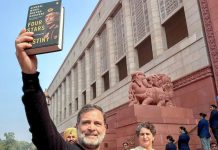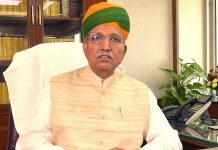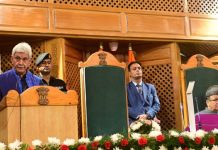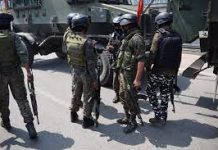
Resistance forces shatter Taliban’s dream to legitimise Afghanistan’s occupation, reports GOPAL MISRA
Within a week of the Taliban occupation of Kabul on August 15, the euphoria of its spectacular success has begun fading; the time is running out for the occupiers unless they announce an all-inclusive government without any further delay. The challenge for their medieval repressive regime under the pretext of Islam has this time come from the Panjsher Valley. The possibility of a countrywide uprising against Taliban cannot be ruled out.
The resistance forces have not only regrouped within a few days of the shameful escape of the Afghan President, Ashraf Ghani, a day before the Taliban occupation, they have already decimated more than 300 Taliban soldiers sent to regain the 11 districts for them. The war has intensified with the Taliban decision to send “hundreds” of its fighters to the Panjsher Valley. There are reports that American aircrafts loaded with weapons and ammunitions have landed at the Kabul airport. The crucial supplies are being now en-routed to Panjsher Valley by helicopters.
The emergence of strong resistance from the regrouped Afghan forces has surprised Taliban as well as Pakistan. The possibility of Pakistan reinforcing Taliban with its regular forces could be the only way to reassert its pre-eminence in the country. During the past two days, among the surrendered Taliban forces, a number of them stated to be having Pakistani army badges. If the conflict spreads, Americans too might extend air support to the Afghan forces.
The Taliban’s refusal to negotiate with the resistance forces led by the First Vice-President (FVP) of the erstwhile President Abdul Ghani Government, Amanullaha Saleh and 31-year-old Ahmad Massaoud, has triggered off the “bloodiest war” on the war-ravaged Afghanistan. The resistance forces are now well-entrenched in the difficult terrains of Panjsher Valley — the land of five lions. The region is known world over for its un-fatigue-able warriors, who have never cowed down before any invader, whether it was USSR during eighties or USA-supported Taliban in nineties, and the during the past two decades the Taliban-Pakistani nexus supported by a section of the Arab world. Saleh’s assertion that under the Afghan constitution, the FVP becomes the caretaker president in absence of the president has prompted officials of the Afghan embassies world over to replace the picture of Ghani with the photo of the FVP.
Meanwhile, the drama of reconciliation planned by China and Pakistan has to be postponed, if not to be abandoned, unless Taliban leadership decides to understand the ground realities. The responsibility to make them reasonable now is with Pakistan and China. It could also have enabled US president Joe Biden to claim that he had succeeded in ushering peace in Afghanistan with a coalition comprising all the main stakeholders in the country. However, as the events are unfolding, the chances of farming an all-inclusive government appear to be remote. With President Ashraf Ghani’s exit from the political scene, a high-level delegation accompanied by the erstwhile government and political leaders such as Salah-ud-din Rabbani, Mohammad Yunus Qanooni, Ustad Mohammad Karim Khalili and many others was in Islamabad, but it could not work out any substantial progress for the composition of a new government.
Meanwhile, the chaos in the country has caused dismay among thousands of people seeking escape from the vindictive Taliban rule. There is also a trust deficit regarding the intentions of the Taliban. Earlier, its spokesman at Doha, Muhammed Sohail Shaheen, in an interview to an Indian television channel had claimed that the Ghani government was responsible for violence across Afghanistan caused by the delayed negotiations. “The people, including women would be allowed to enjoy full freedom, but they would be asked to maintain the disciple of the religion and the Sharia laws”, he stated.
The information pouring from different sources confirms that the Chinese have supported the Taliban’s victory strategy of August 15, which was being finalized at the Pakistani GHQ. Also, there are reports that China had ensured Iranian support for the Taliban occupation of Shia territories and Herat; and thus a new formidable troika-Pakistan, Iran and China, has emergedplanned maneuvering of a dragon ensuring that the world’s only Super Power, USA, finally yields to the well-planned manoeuvring of dragon.
Hamid Gul, a former chief of the Pakistani secret services outfit, Inter Services Intelligence (ISI) is being extensively quoted for his boastful statement that that history would remember ISI for using America to defeat Russia from Afghanistan, ISI-trained Islamic radicals to attack America, and later its proxies would also defeat America in Afghanistan. Thus, the past allegations of ISI nexus with Taliban, al-Qaeda and other terrorist groups are no more any secret. One of the most dreaded Haqqani network is now controlling Kabul city.
CHALLENGE TO TALIBAN
The Saleh-Massaoud team has dared the formidable Taliban leadership comprising the world’s most dreaded terrorists. It has upset, at least for the time being the great plan hatched of subjugating Afghanistan by the three powers in the region, Pakistan, China and Russia. Immediately after the occupation of Kabul, they had also succeeded in luring, the former Afghan president Hamid Karzai and Abdullah Abdullah, the number two in the erstwhile Ghani government, to the negotiating table. However, there has been no break-through so far for ensuring a respectable share fro them in the proposed Taliban government. In spite of the pictures released by Taliban revealing their leader Anas Haqqani with the former president Hamid Karzai, Chairman of the High Council for National Reconciliation (HCNR) Abdullah Abdullah and Hezb-e-Islami veteran Gulbuddin Hetkmatyar, the formation of the new Taliban government is being awaited.
Meanwhile, in their bid to ensure security to the citizens, they also met the ‘so-called’ acting Taliban governor of Kabul, Abdul Rahman Mansour, on August 21. However, within hours of this meeting, more than a dozen citizens were shot dead by the patrolling Taliban soldiers and women were humiliated. There were also reports of common citizens being picked up and executed. While the two leaders were meeting, the video of the execution of the police chief of Badghis province in Herat, Haji Mullah Achakzai was released.
Amidst this on-going impasse in the political negotiations, the Pakistani foreign minister, Shah Mehmud Qureshi, rushes to Kabul, but it appears, he has failed in his mission. He could not convince that “the new government cannot be lead by dreaded terrorists.” The response from the citizens against the Taliban is now surfacing in different parts of Afghanistan. The citizens of Kabul already have celebrated the Afghan Independence Day on August 19 with their traditional flag and even removed the Taliban flag hoisted on various buildings. Earlier, a high-level delegation of Afghan political leadership including Speaker Wolesi Jirga Mir Rehman Rehamni had arrived in Islamabad, but no substantial progress for the formation of the new government could be made.
Both Saleh and Massoud have spelt out their terms for a coalition government that each stakeholder should be respectfully accommodated as equals. They would continue their struggle unless Taliban and its mentor, Pakistan, concede their demand. It may be noted that Ahmad Massoud’s father, Ahmad Shah Massoud had led the Northern Alliance during 1996-2001 and offered strong resistance to the Soviet occupation forces in the 1980s. His son has declared he was open to “negotiations”, but Taliban should not expect that they would be able to re-enforce their writ by force. While seeking the support of the western powers, he told the American daily, Washington Post, that “The Taliban are not a problem for the Afghan people alone. Under Taliban control, Afghanistan will without doubt become ground zero of radical Islamist terrorism; plots against democracies will be hatched here once again.”He also remembers that his father was killed days before the Sept. 11, 2001 attacks on the United States by al-Qaeda terrorists.
Amidst these developments, the world’s most wanted and dreaded terrorist have resurfaced in Kabul. The Haqqanis, who have fathered al-Quaeda with the connivance of ISI are now manning Kabul with their gun-trotting 6,000-strong well-armed force indulging in sporadic firings. It is now an open secret that the unchallenged march of the Taliban force to Kabul was well-planned military conspiracy hatched at the GHQ, Rawalpindi; perhaps, having the prior approval of the Biden administration. In this context, it was natural for Ashraf Ghani to escape from Kabul. The reports pouring in from the war-ravaged countries indicate that the government forces were told by their respective commanders not to fight with the Taliban. Maybe, it was a belated realization that the Kabul government was taken for a ride by the combined takeover plan of the Taliban forces. The Haqqani network’s proximity to Mullah Omar is well-known. Siraj Haqqani, the son of the famous anti-Soviet fighter Jalaluddin Haqqani, is more extreme than his father and maintains closer ties to al-Qaeda and other foreign extremists in Pakistan. The religious head of Taliban, Mullah Haibatullah Akundzada, is still based in Karachi in Pakistan. Also, Abdul Ghani Baradar, who had led the Doha talks with USA, was in a Pakistani jail, and was released and flown to Doha for initiating the talks. Earlier, he had fought side-by-side with the one-eyed cleric, Mullah Omar in 1996.
Mullah Yaqoob, son of late Mullah Omar and head of Taliban military commission, has already taken over power in Kandhar. He had arrived from Doha on August 18. It was in Kandahar that Mullah Yaqoob’s father was declared Emir-ul-Momeen on April 4, 1996. Meanwhile, the Pakistan based Jaish-e-Mohammed (JeM), a fellow Deobandi terrorist group, has demanded jagirs or land in south Afghanistan. They have already seized cash from the government treasuries, top of the line US weapons and military vehicles.
UNOFFICIAL RECOGNITION
Even before the new government in Kabul could be accorded international recognition, within a week of Taliban’s spectacular walkover to Kabul, the embassies of Pakistan, China and Russia are functioning normally. It appears that these countries did not expect any substantial resistance to the Taliban takeover.
Indian embassy could have remained functional, though advised by a senior Taliban leader Sher Mohammed Abbas Stanekzai, but due to the presence of ISI proxies in Taliban forces, the threat perception to its staff remained high. Therefore, it was finally decided to close the embassy till the situation returns to normalcy. While India and its close allies are in a wait and watch mode, the Taliban are getting support from Britain whose Chief of Defence Staff General Nick Carter is openly lobbying for the Sunni Pashtun group to be given a chance at Kabul. It was Carter along with Pakistan Army who was instrumental in cutting out the deal at Doha through special US envoy Zalmay Khalilzad. This Accord has led to the disenchantment of the other ethnic groups comprising more than 50 per cent of the population. It is estimated that the Pashtuns are not more than 41 per cent of the total population. The other major ethnic groups are Tajik, Uzbek and Hazaras 16, 11, and 15 per cent respectively. The remaining ethnic groups are spread across the country.
After the USSR’s intervention in Afghanistan in1979, USA had liberally funded the Islamic groups, especially Afghan Mujahedin through the Pakistani army and ISI. In 1992 the Soviet-backed government of Ahmedzai Najibullah collapsed. The capital, Kabul, came under the control of Tajik, Uzbek and Hazara forces led by Tajik guerrilla leader Ahmed Shah Massoud, with his base of support in the north-eastern Panjshir Valley, and Uzbek commander Abdul Rashid Dostum, with his base in the northern city of Mazar-i-Sharif. These forces later became the Northern Alliance.
There has always been distrust between the Northern Alliance and the Pashtuns. The Pashtun forces led by Gulbuddin Hekmatyar invaded Kabul against Massoud, and thus the Taliban government was formed in 1996 with the support of Pakistan. The history now appears to be repeating. It is quite embarrassing for the Biden administration to openly support Taliban’s repressive regime on the advice of Nick Carter. Earlier, the American disenchantment with Taliban and al-Qaeda had begun with the bombings of US embassies in Africa in 1998. America had responded by cruise missile attacks on terrorist training camps in Afghanistan.
There are reports that during this period, America was considering supporting the Northern Alliance and Russia, in its offensive against the Taliban, but before it could take place, ISI and Taliban operatives assassinated Ahmed Shah Massoud, and two days later on September 11, Taliban and al-Qaeda attacked USA. It is believed that a similar effort was made during the Biden-Putin summit, but America could only get assurance for a safer passage for its people from Russia.
IMPACT ON INDIA AND PAKISTAN
The Pakistani Prime Minister, Imran Khan, who earlier had called Osama-bin-Laden a martyr, welcomes the Taliban takeover of Kabul “Afghans had finally broken free from slavery.” Amidst the reports of country wide festivities welcoming the Taliban victory, a Taliban flag was hoisted on the rooftop of the seminary adjacent to the Lal Masjid, Jamia Hafsa, a women’s madarsa in Islamabad .
In India, the secretary of the All India Muslim Personal Law Board (AIMPLB), Maulana Umrain Mahfuz Rahmani, and national spokesperson Maulana Sajjad Nomani, have praised the Talibani’s take over. Umrain has stated, “We salute the Taliban fighters, they have defeated the strongest army. An unarmed nation has defeated the strongest army. They entered the palace of Kabul.
The whole world saw how they entered Kabul. There was no pride or arrogance in them.”He, however, has been criticised by Maulana Yasoob Abbas , general secretary of the Shia personal law board, who appealed that those in India with “Taliban mentality” to have a rethink; it is very unfortunate that some Muslims in India are celebrating the Taliban’s power grab.” He further stated, “On behalf of the All India Shia Personal Law Board, I would like to condemn Taliban in the strongest words. This is the same Taliban that do not just oppose Hindus but have committed atrocities on Shia Muslims.”
The statement of Shafiqur Rahman Barq, a 91-year old veteran member of Lok Sabha, has caused anxiety in New Delhi. He is elected from a pre-dominant Muslim constituency of Sambhal in Moradabad, just 120 kilometres from the national capital, New Delhi, when he praised Taliban for taking over Afghanistan, and compared the aggression with India’s freedom struggle against the British.
Meanwhile, Maulana Sufiyan Nizami, a spokesperson for Darul Uloom Farangi Mahal, an Islamic seminary in Lucknow, cautioned “ no one should be in a hurry to praise the Taliban. We should look forward to our foreign policy and how things evolve between the two nations. One should patiently wait and see if the Taliban follows what they are claiming this time (on human rights and moderate face).”
THE CAA QUESTIONED
The statement of the Indian foreign ministry assuring a safe return for members of the Sikh and Hindu communities stranded in the crisis-ridden Afghanistan is being questioned. In an interview to an Indian channel, former Indian envoy to Afghanistan stated, “it should have been better drafted to avoid misunderstanding.”
He clarified that due to uncertain situation, the embassy had to be closed down, but however, e-visa is being issued even to those Muslims, who do not have a valid pass-port, and they would be evacuated as soon as the flights are being permitted.
THE TALIBAN EXPOSED
Many believed that Biden administration deliberately allowed the sudden takeover of Kabul by the Taliban, but it could have been a strategy to enable the Islamists to face the wrath of the common people. The events unfolding during the past 10 days indicate that the Taliban, if they do not take initiative to form the government, they would finally lose their legitimacy as a group, which could govern and rule a territory.
The final exit of the US-led western forces from Afghanistan was vehemently criticised across the world as yet another example of abandoning millions of hapless people. It was compared with the exit of US forces from Saigon in the Vietnam War in 1975.
Biden was also accused of having secret negotiations with Taliban. Since, he had served as the chairman of the Senate Foreign Affairs committee, Biden was expected to ensure a smooth transition in Kabul. Maybe, his decision to retain the services of American envoy for peace talks in Afghanistan, Zalmay Khalilzad, appointed by his predecessor, Donald Trump, was an effort to retain continuity in the ongoing Afghan negotiations.
While Biden ensured safe passage for the people of his country and allies, he has frozen the $10 billion of the Afghan Government.
It means the Taliban need financial support for running the government offices and the country’s economy. With their occupation of the country, they have to ensure supply of essential goods and petroleum products. Since Pakistan itself is facing economic crisis, only China can come to its rescue.
China has already stated at it would accept the Taliban’s decision to rename the country as the Islamic Emirate of Afghanistan (IEA).
China’s decision to legitimatize the new Taliban-led government would depend upon the formation of an inclusive government, which appears to have been delayed. However, by spelling its support to the Taliban, it has alienated a large section of Afghan men and women, who have ben exposed to democracy for the past 20 years. Many among them, who are in twenties would soon be subjected to the medieval repressions for the first time. The girls without a veil would be caned; and the girls above the age of 12 would be abducted and forced to marry the Taliban as ‘sex slaves’.
However, there are a few questions, which would be difficult for the US administration to respond. For example, why America did not prevent Pakistan to support Taliban? Did America deliberately ignore the ‘drug-nexus’ between the ISI and Taliban? How much funding Taliban were receiving from China?
NEW WAVE OF RADICAL ISLAM
With Taliban’s final takeover of Afghanistan, India is now faced with an unprecedented challenge from her neighbours, Pakistan and China, ready to use the Islamic card against her. During the Covid-19 pandemic in 2020, the death of a Black young man was exploited by China and its proxies by fudnign and supporting the movement, Black Life Matters (BLM). They would be targeting India for causing social and religious unrest.
Earlier, India had faced the Islamic terrorists from Pakistan having liberal funding from US-led western powers.
However, with her long borders with Pakistan and China, the Jihadi threat appears to be looming large upon India’s horizon with unprecedented intensity. India is not unaware of these developments.
It will be a legitimate question, if Biden administration was only keen for being given just a safe exit of its citizens from Afghanistan, but would it support the forces challenging the Taliban.
Saleh has stated that Taliban is not only a threat to the region including India, but to the rest of the world. It may be recalled that during the First Anglo-Afghan War (July 1839 – October 1842), the soldiers of the British army were mainly from Bihar and UP, they were annihilated during their retreat from Kabul.
India was expecting substantial action from the erstwhile Donald Trump administration, but it was later learnt that President Donald Trump had signed an agreement with Taliban to end the Afghan War without consulting Pentagon and the foreign office. There were some secret clauses in accord, thus the Biden administration has little options but it has just to implement it. However, with the exit of its forces, USA would not hesitate to extend air-cover to the forces assembled at Panjsher.
With most of the terrorists now in open, USA has an opportunity to shed off its reluctance to decimate the centres of terrorists run by al-Qaeda, Muhjahideens and other terror groups, which have had re-emerged after 2011. He, perhaps, avoided being sarcastic like the former US President, Donald Trump, who commented about Taliban’s occupation of Kabul that “miss me yet?”
INDIA’S NEW ROLE
India is to tackle the changing situation in Afghanistan with new zeal. It is expected that a comprehensive policy would soon be worked out with the consultations with the major political parties. The country’s political class is perturbed with the sudden exit of America from Afghanistan. It is aware of challenges ahead due to paradigm changes in the strategic geo-political environment. India has already contributed billions of dollars in Afghanistan and Iran in constructing facilities and infrastructure , which would soon be under the control of China and Pakistan.
The three-power nexus, China, Pakistan and Iran would soon be adopting aggressive postures, if not belligerence in the region. India being the front-line state would be facing the brunt of the Afghan developments.
The Indian security has to be revamped to enable it to face a new wave of terrorists in Jammu-Kashmir, and Chinese military incursions on her nearly 3000 kilometres of borders from the western Himalayas to the north-eastern region.
BIDEN SHOULD BACK ANTI-TALIBAN FORCES
The Biden administration has little choice, but to support the anti-Taliban forces in Afghanistan. During the pandemic in 2020 , in spite of noisy statements, the world’s only Super Power, USA and its formidable European allies, could not even get an independent enquiry into the leak of the deadly Corona Virus from a Chinese facility, and now in 2021, the US-led western powers had to leave
the war-ravaged Afghanistan in the most humiliating situation. However, the democratic world can regain the confidence of the world, if US-led the western powers support the freedom-loving Afghans.
Biden cannot say that he did not get detailed minute by minute report about the new strategy adopted by Taliban, Pakistan and China. America could get the details of the ongoing communication among these countries on the Thuraya satellite as well as on the burner phones.
For China now, apart from accessing, three-trillion worth of mining rights in the difficult terrains amidst the tortuous mountain ranges and valleys of Afghanistan, the decks would be clear for the road connectivity to the Central Asia and Europe under a Taliban regime.
ABOUT OPERATION CYCLONE
The United States Central Intelligence Agency (CIA) had given the code name, Operation Cyclone, to the massive American assistance to Pakistan for promoting radical Islam among common people and to raise a formidable force of Afghan Mujahideen during the decade 1979-1989.
The British intelligence agency MI-6 too was collaborating in this task with the regime of the then Pakistani dictator, Zia-ul-Haq. Zia-ul-Haq, who had deposed the first elected Prime Minister of his country, Z.A. Bhutto, and had later, got him hanged through a sham judicial trial.
Thus, America unleashed terror forces to end the secular socialist regime in Afghanistan to end the influence of the USSR. The Operation Cyclone was one of the longest and
most expensive covert CIA operations ever undertaken. In 1979, it had begun with a sum of USD 695,000, and the funding was increased dramatically every year. It rose to USD 630 million per year in 1987. And during 2001-2021, America has reportedly spent more than three trillion USD in Afghanistan.
CHRONOLOGY
The Islamic terrorists under the banner of al-Qaeda’s suicide bombers, nurtured in Afghanistan, attacked the twin towers of New York and Pentagon on September 11, 2001. America asked the Taliban government to handover the terrorists, but it refused. It led to the fierce American bombing of the country.
The following is a timeline of key events:
WAR ON TERROR: On October 7, 2001 — less than a month after the September 11 attacks that killed around 3,000 people in the United States — President George W. Bush launches “Operation Enduring Freedom” in Afghanistan.
The operation opens a military front in the US “war on terrorism” and within weeks, US-led forces overthrow the Taliban, who had been in power since 1996. The Taliban, however regroup in their strongholds in southern and eastern Afghanistan with the help of the ISI. In a bid to crush them in 2008, the US command in Afghanistan was augmented with more troops, bringing the total to 48,500 US soldiers deployed. The number rose to 100,000 during the regime of US President Barrack Obama in 2009.
On May 2, 2011, the US Special Forces operation in Pakistan killed Osama-bin Laden, one of the most dreaded terrorists of the world.
However, the situation on Afghanistan started deteriorating in 2015 following the spread of insurgency and the presence of the new group, Islamic State President Donald Trump redeploys thousands of additional soldiers in August 2017.
The following year, Washington and Taliban representatives discreetly open talks in Doha, led by US special envoy Zalmay Khalilzad. It finally led to the historical accord on February 29, 2020, the United States and the Taliban sign a historic deal. It was decided to withdraw all foreign forces from Afghanistan by May 2021. President Joe Biden announces he will stick to the agreement with the Taliban, but delays the drawdown deadline until September 11. However, with the capture of Kabul, American forces have decided to leave the country immediately.
WHAT’S IN STORE
The coming weeks may witness the spread of the Afghan conflict with more and more ethnic groups, especially Hazara and Uzbek, joining the forces regrouping against Taliban. It is also possible that a large section of Pashtun, the pre-dominant group in the country, too pick-up arms against the Taliban’s repressive regime.
The indications are the world’s seven most powerful countries are in no hurry to accord recognition to the Taliban-led regime amidst the fierce fighting between the Afghan Government forces regrouped under the Northern Alliance, just 120 kilometres from Kabul and nearly 30 kilometres from the Bagram airbase complex. Meanwhile, the failure of the Pakistani mediators to help all the warring groups on the negotiating table has angered the Taliban leadership. They have postponed the much-awaited visit of the Pakistani foreign minister to Kabul. Interestingly, it was the Pakistani initiative that Taliban could occupy Kabul without resistance, but the reports indicate that due to the stubbornness of some of the terrorist groups within the Taliban, especially Haqqani network, the reconciliation efforts have failed.
The G-7 countries comprising Canada, France, Germany, Italy, Japan, the UK and the US may offer humanitarian assistance to the Taliban-controlled war-ravaged country, but it is difficult to predict that its frozen assets estimated to be more than eight billion USD would be released to the occupants.
The Taliban has claimed that it has recaptured the three districts, Bano, Deh Saleh, and Pul-e Hesar, in the northern province of Baghlam. Its forces have reached Badakhan, Takhar and Anadarab. It has also reiterated, though doubtful that it controls the Salang Tunnel, which connects the Southern Afghanistan with the Northern provinces. The acting president, Amanullah Saleh, the defence minister, Bismillah Mohammedi and the Ahmad Masoon, has rejected the Taliban claim of the military successes. The unconfirmed reports have stated that nearly 1000 Taliban gorillas have so far been killed during the past six days. There are also reports that the Afghan forces have also now in control of Chark, which connects Kabul with Mazar-i-Sharif. Meanwhile, the Afghan air force has shifted its jet fighters and helicopters to a nearby air base of Uzbekistan.
The G-7 countries may offer mediation, possibly through an international mechanism to usher in peace, but much would depend upon the Taliban leadership, which faces unnecessary interventions from the Pakistani army and ISI.













